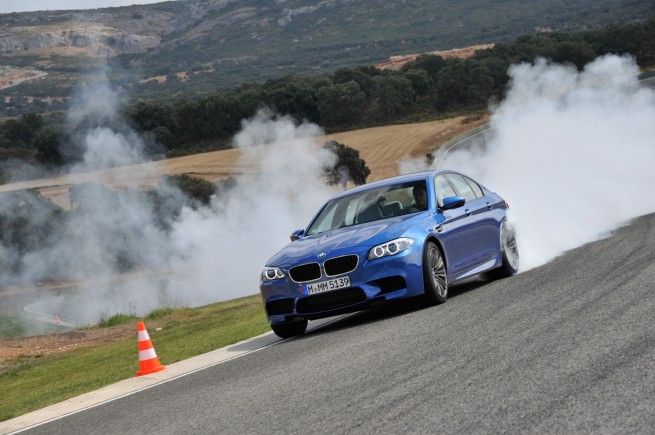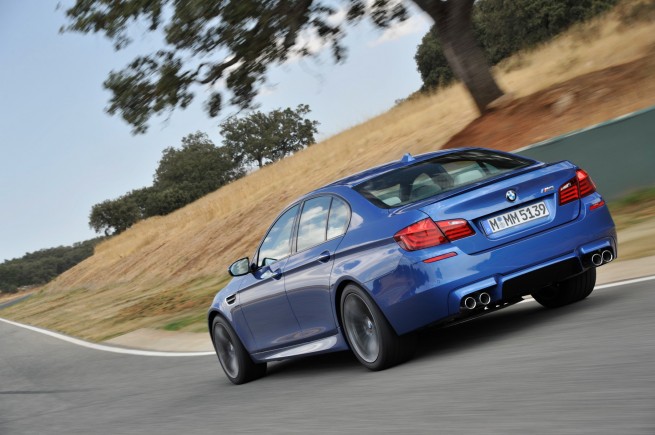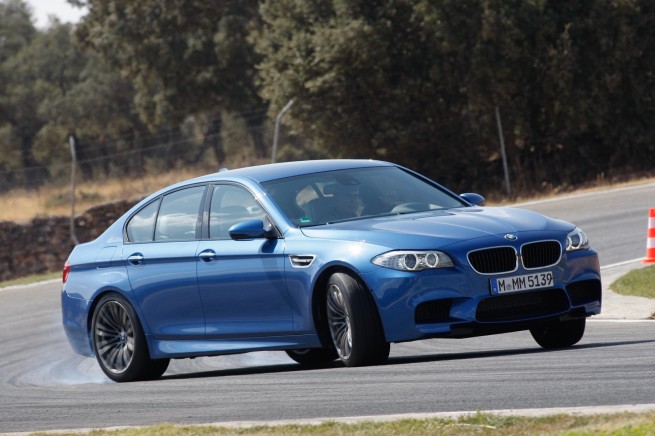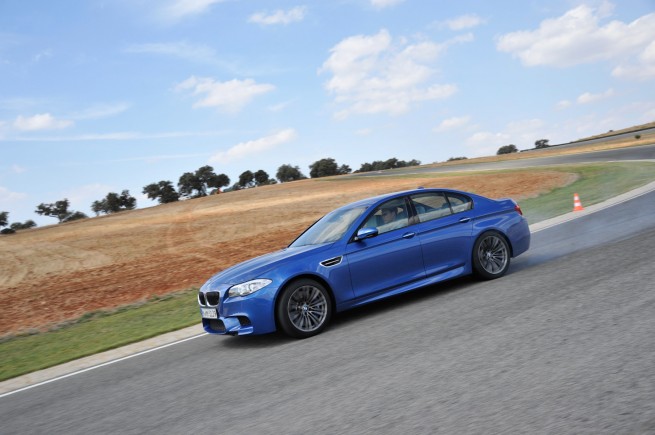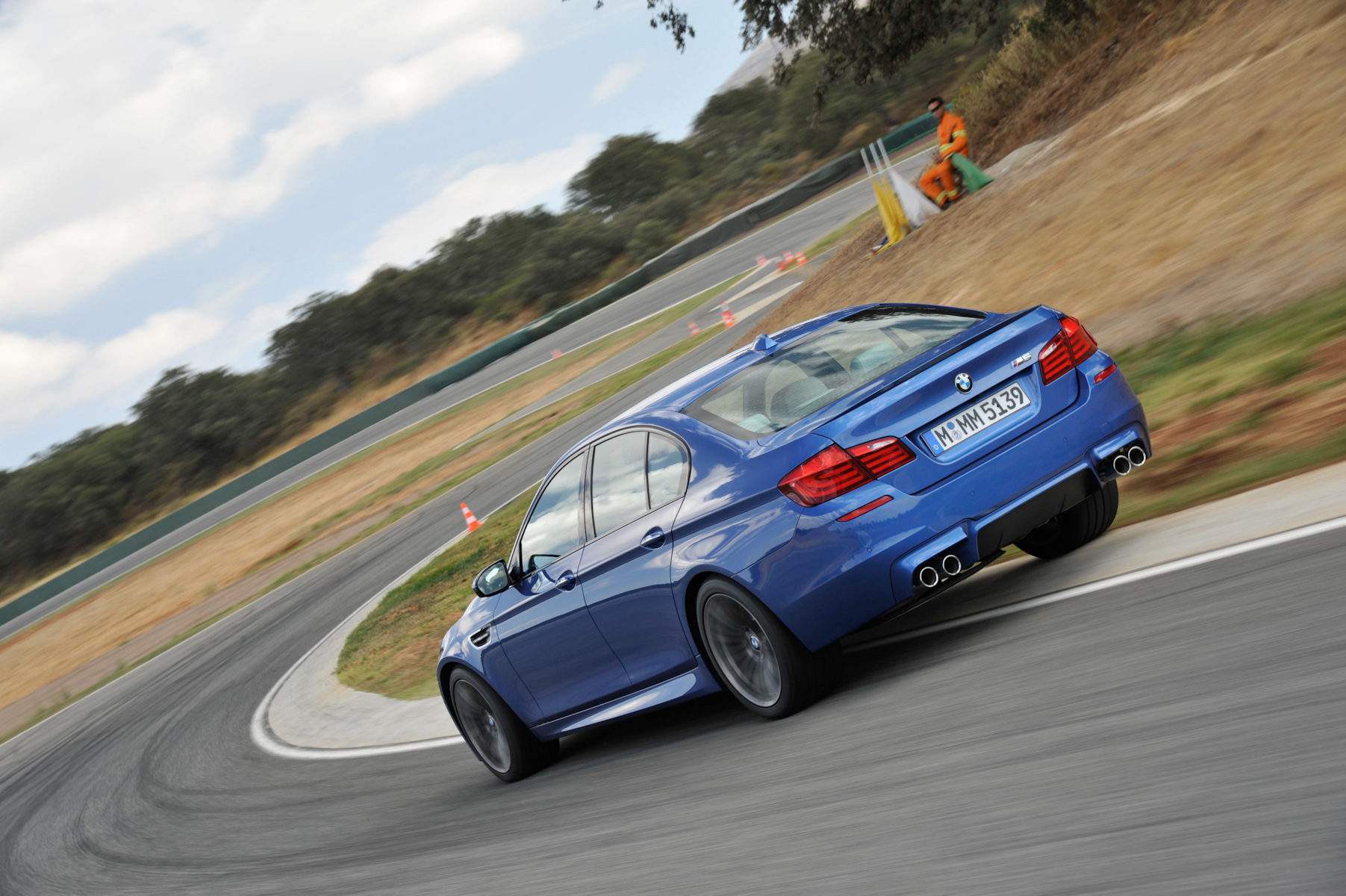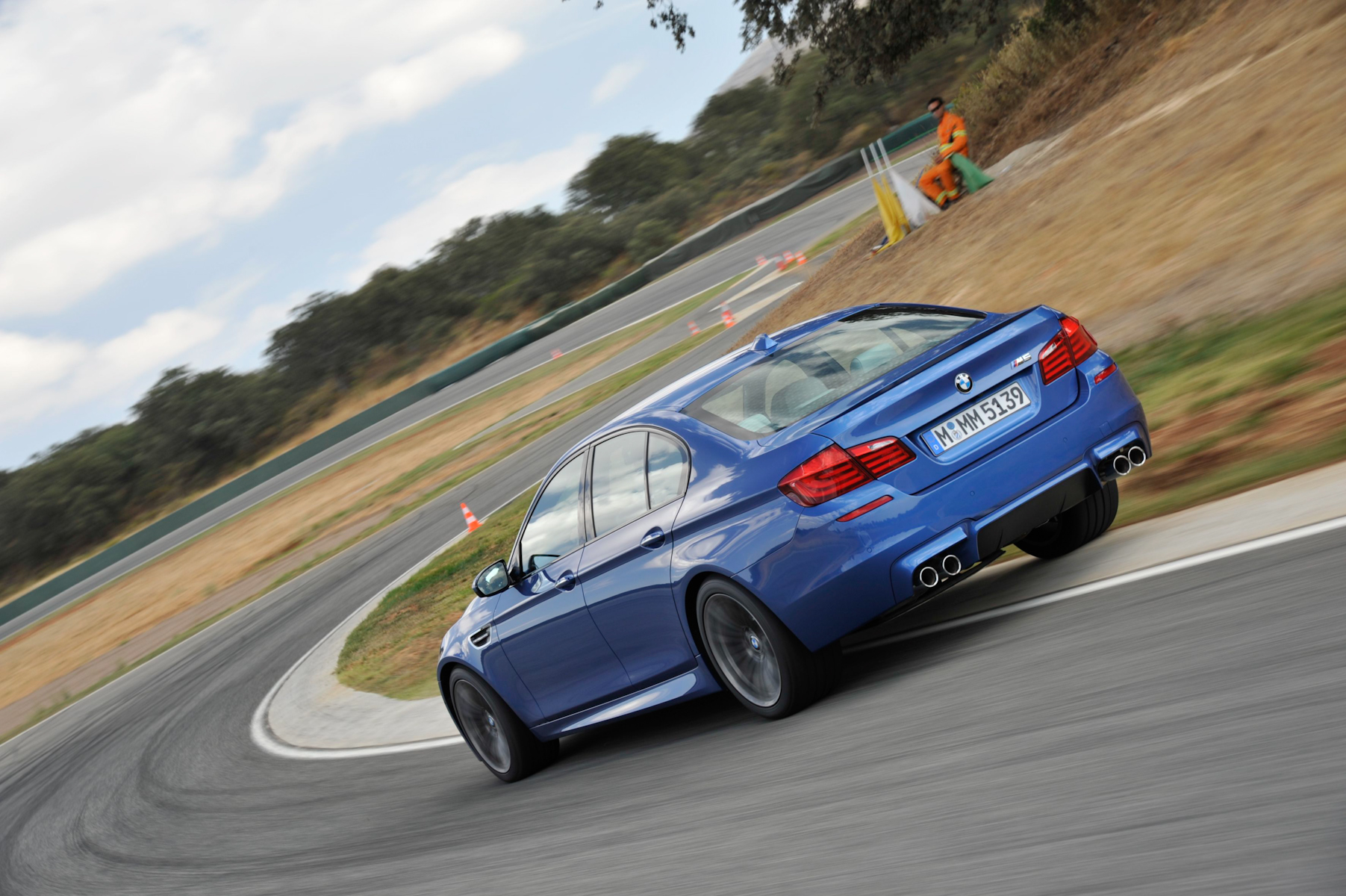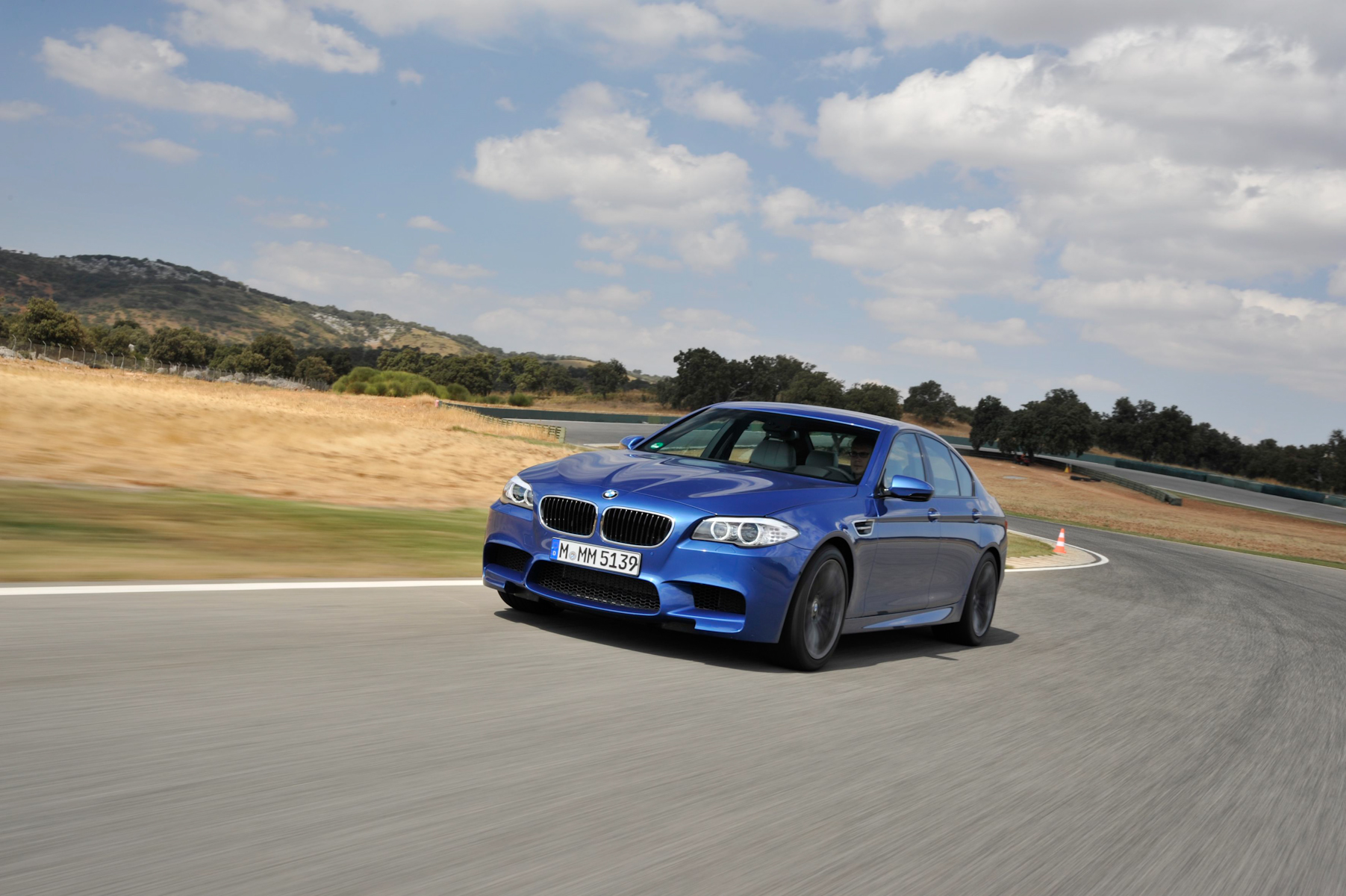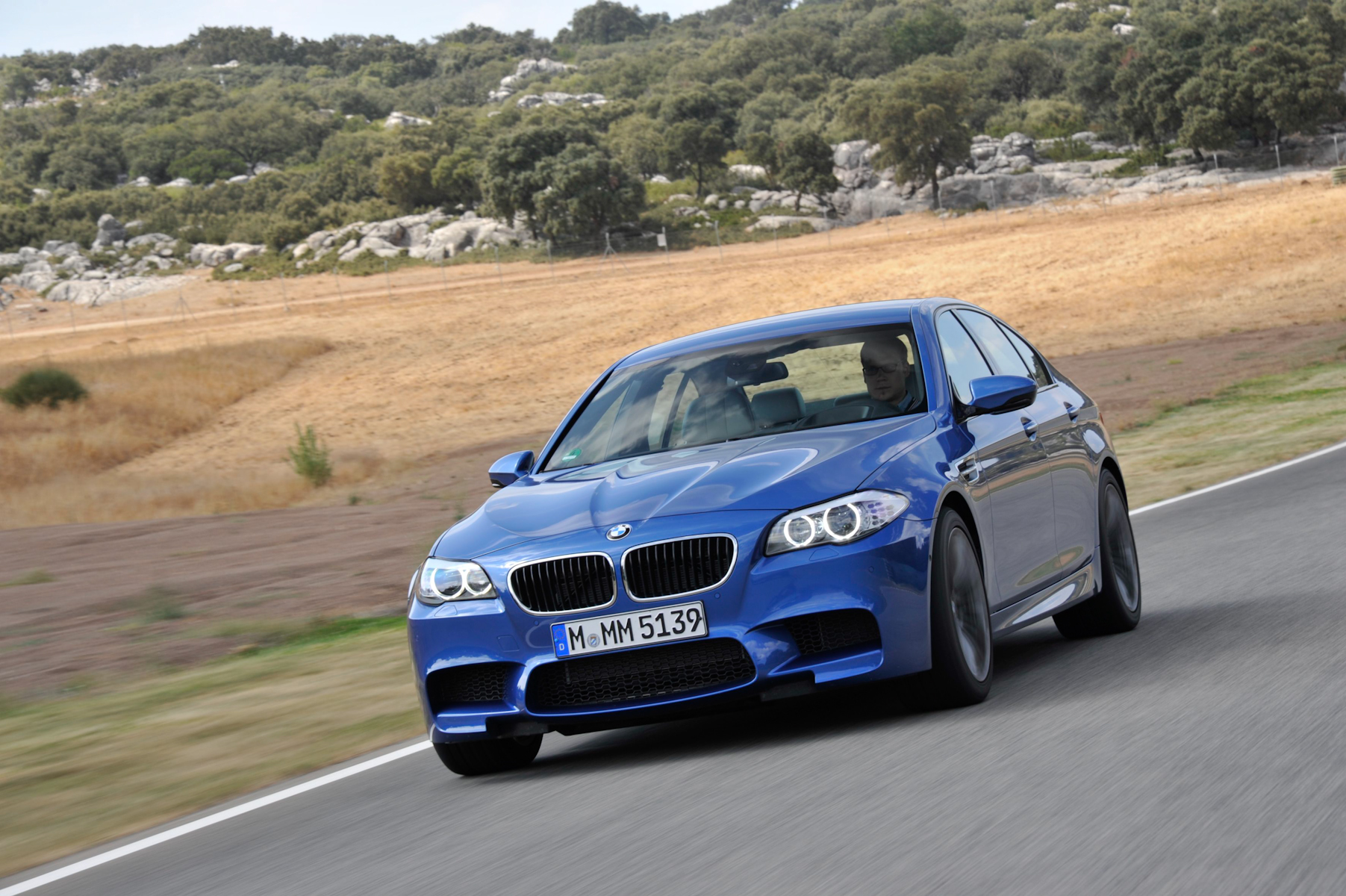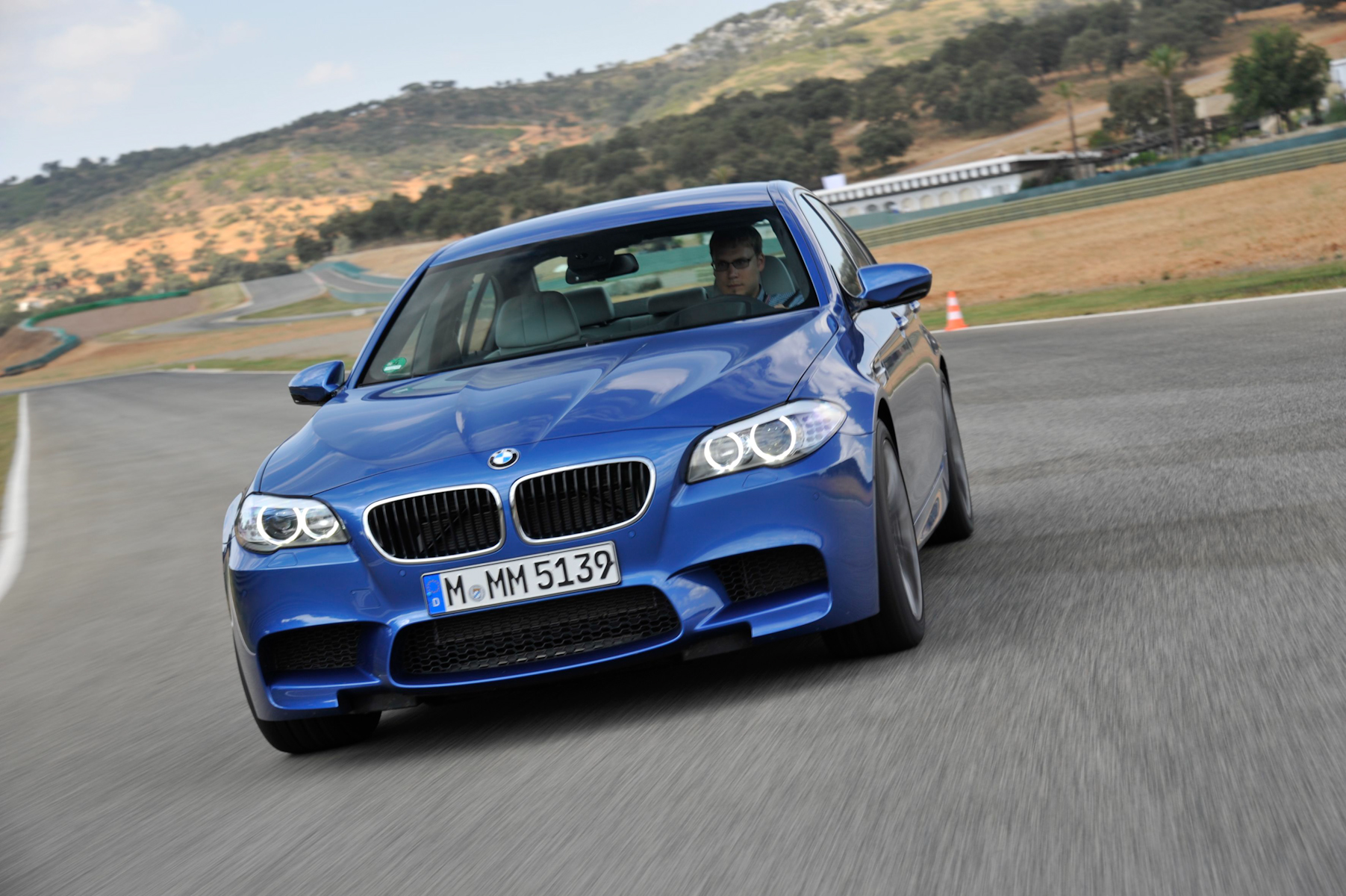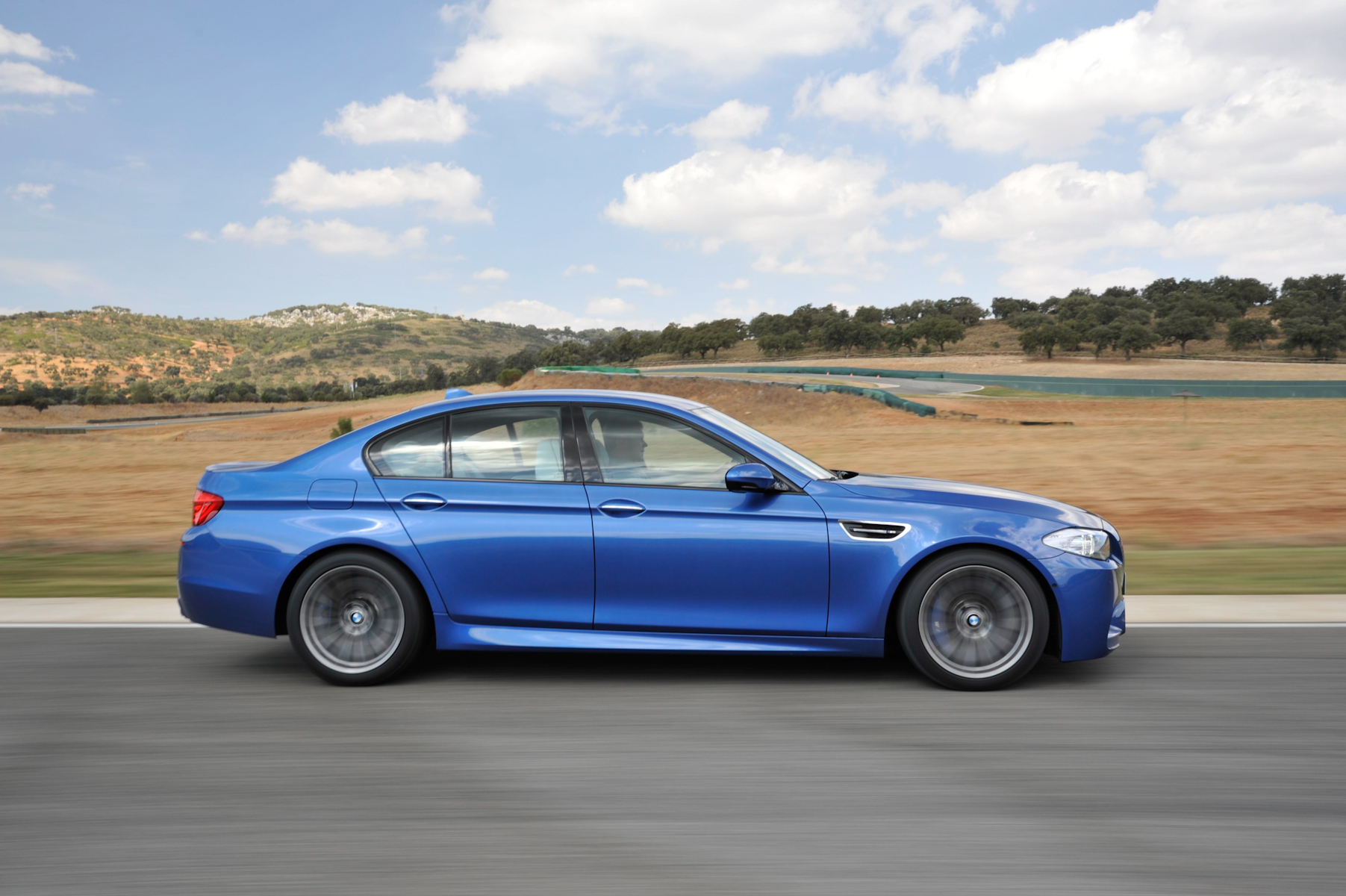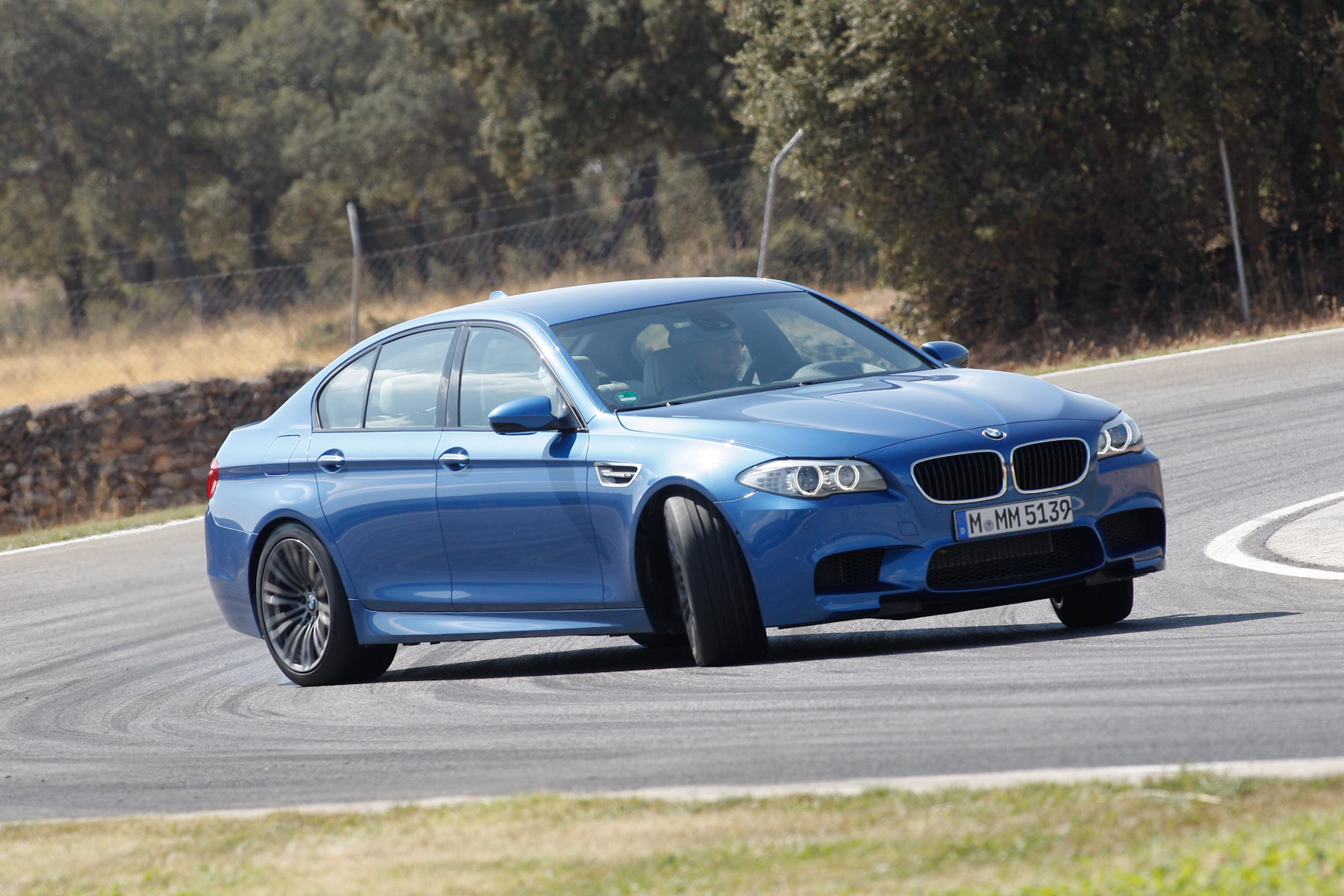In its fifth iteration, BMW’s M5 has grown in every measurable way. It is once again larger, heavier, more powerful, and packed with even more technology. But evolution is not always synonymous with improvement, at least in the automotive world.
BMWBLOG recently had the opportunity to unleash BMW’s new F10 M5 on the Ascari race circuit in Ronda, Southern Spain. Ascari is a fitting track to test the dynamics of the new M5. Featuring a mix of 26 challenging corners borrowed from other racetracks around the world – it easily pushes cars to their limits. Fast sweepers, tight 2nd gear kinks, off camber corners, heavy braking zones, elevation changes and a left-right chicane – it’s all there in one lap.
After a grueling day on the racetrack we were able to glean many observations about BMW’s latest M5. Our findings may surprise you, and in a happy “butterflies in the stomach” kind of way. Strap in for a lap of Ascari.
Down Pit Lane.
Sitting in the paddock, the time has come to fire up 8 force-fed cylinders and put the transmission in gear. With key in pocket, we hit the starter button to the right of the steering column, bringing the M5 to life. A guttural bark quickly exits the quad tail-pipes with a blip of revs, then the engine settles into a refined but still audible hum. This is going to be good. The 7-speed Getrag sourced dual-clutch transmission is engaged by bopping the gear knob to the right, or grabbing the right steering wheel mounted shift paddle. Before pulling away, we used the “M button” to pull up our preferred car settings for track use. The transmission is set to its fastest shift times, the steering is heavily weighted, the suspension is in its firmest ‘Sport Plus’ setting, and the engine is set to deliver its most aggressive and direct throttle response. The dynamic stability and traction control (DSC) are, of course, turned off.
Now that we’re in first gear, throttle can be feathered to get the car rolling. Computer wizardry modulates the automated clutch, leaving your left foot to ponder the comfort of your socks. As we slowly roll down pit lane, we can feel a calm before the storm. We approach a flag marshal showing a green flag at pit exit. It’s time to test BMW’s 2012 M5.
A Lap of Ascari.
As we cross the painted line relieving us of the pit lane speed limit, I stab the throttle to test for grip and put some heat in the rear tires. Already deep into the V8’s plateau of torque, the rear tires immediately light up and dispatch us up the access road merging with the track. A glimpse in the rear view mirror reveals a handful of bystanders still gawking at the back end of the M5; the flag marshal is covering his ears seen through a thin fog of smoke.
Already revving through third gear we are now braking downhill to the first corner, a 90′ left. The M5 feels incredibly stable despite the steep drop of the track; I expected the rear end to feel more nervous under hard braking here. Gradually releasing the brakes as I continue to slow for the apex, the car remains stable. Back on the throttle, the car pushes wide to corner exit, and still carrying left steering lock, we enter turn two.
Passing the apex of turn two, a much wider radius left hander, I feed the power in, again feeling for grip as weight transfers rearward and the car pushes wide. The throttle provides incredible feel and response for a force-fed engine: as the tires squirm under acceleration I can feather the throttle to keep the tail from rotating and maintain a clean line.
Turn 3 is another left hander taken at higher speed. Again the M5 turns in neatly, clips the apex, and impresses with its quick and nimble transition to the immediately following right hander. A low center of gravity is to thank here, owed to several technical improvements in the F10 M5, including a more compact engine mounted 10 mm lower in the frame. The transmission is also mounted lower.
Leaving turn 4, we go up through the gears building speed. The dual-clutch transmission bangs the gears in with aggression and in its sportiest setting, gear shifts are felt as sharp nudges through the seat. We do note a slight delay in shifts between paddle actuation and actual gear change – my finger tips are back off the paddle by the time the gear change is actually felt. Porsche’s PDK transmission is superior in this regard, with more instantaneous shifts; the gear change is felt almost in parallel to the flick of your fingertips.
Turn 5 is another fast right hander leading to a short straight. Again descending downhill, we enter the braking zone for the next corner now carrying serious speed. Turn 6 is a near-hairpin second-gear right hander preceded by a very heavy braking zone. The massive 6-piston front brakes work in balance with the rear brakes to burn speed quickly, hanging you from your seatbelt. The weak link in deceleration here is available grip from the tires, not the power of the brakes. Now at corner entry, it is imperative to sharply rotate the car to the apex which is found wider to the outside of the track. This corner proves a great litmus test for handling as the car must remain neutral to be fast here – heavy understeer will push you off line and require a slower entry speed. Here, the M5 feels impressively neutral with only minor understeer noted. Playing with different lines through this corner, I found that power oversteer worked well to rotate the car towards the exit, a quick jab of the throttle is used to rotate the car around the front wheels – now pointing toward the entry to turn 7.
Continuing to accelerate with a modest slip angle, we accelerate into turn 7 and dive for the inside. Turn 7 is a wonderful on camber corner that helps glue the car to the road. An unusual amount of throttle can be added here without losing the rear end because the car is pressed heavily into the asphalt. In fact, after clipping the apex I fed in full throttle and grabbed third gear without so much as a twitch from the rear.
We won’t go on to narrate the remaining 19 corners of the track, but I will continue with a few corner highlights which showed something interesting about the dynamic competence of the car.
The left-right chicane again flaunts the agility of the M5, feeling completely stable through the left-right-left complex leading to the next corner. The M5 has gained 253 lbs over its predecessor (now 1,870 kg / 4,123 lbs), yet hides its low-slung weight very well in transitions.
The all aluminum suspension has improved kinematics, which keep the tires mated perfectly to the road surface through corners. Yes, the increased weight is felt, but with so much grip from the tire/suspension combo, the M5 can carry terrifically high corning speeds without feeling unwieldly. The M5 also features a quick steering ratio of 2.6 turns lock-to-lock; this also helps to give the M5 a more reactive, quick-reflex feel.
Nearing the end of our lap, we enter a fast uphill right hander which flows into an off-camber downhill left hander. This is a serious corner. Here, with big entry speed, the M5 feels heavy. You feel every pound of its weight, and you are reminded that the luxuries of the high-tech cabin and increased size come at a price. The faster you take this corner the scarier it is, because the car really does not want to stay on the track. Of course, thanks to countless hours of fine tuning on the Nurburgring, M engineers have perfected a chassis and suspension that compensates extremely well for the added weight. The M5 carves corners like a scalpel… a really big, heavy scalpel in the context of sports cars – but a scalpel nonetheless.
Finally, we enter a sweeping downhill right hander that brings us back to pit lane. The track is wide here, and since we’re about to park the fun, we hit the throttle and counter steer through a high-speed slide. It is unbelievable how controllable this car is through a drift. Throttle response is so precise, so linear, the chassis is so balanced, the suspension is so finely tuned, that otherwise tricky maneuvers become child’s play. This is bar-none the most responsive turbo car I’ve ever driven. Yes, lag is still perceptible in the higher gears, but never so much as to force your mind to be cognizant of it. In the new M5, you just… drive. And you drive your heart out.
There has been some concern that BMW’s new M5 has been watered-down. That it is somehow less of an M car – more of a luxury boat with a really powerful engine. This is blatantly false. At the limit, the M5 can be finely balanced through corners. Okay, it’s no Lotus Elise and it carries more weight, but M fairy dust has given the fifth generation M5 handling that will impress. Features such as a directly mounted rear sub-frame leave no doubt about the engineers’ intentions. This is a chassis approach previously reserved for race cars – consider that before passing judgment on the direction and future of M cars.
In Conclusion.
BMW’s new M5 seems to defy physics to some degree during 10/10ths “seat of the pants” testing. Yes, I haven’t had much negative to say, but that’s because there isn’t much to pick on in this car. Okay, I lament the added weight – no question. And frankly, I would have rather seen the M5 grow smaller – not larger in size. I still feel the E39 M5 was the perfect size for such a car. I’m also a sucker for high rev – excuse me – extremely high rev engines. Perhaps I owe this to my affinity for riding sport bikes which rev out over 14,000 rpm. It’s true that the new M5’s engine redlines more than 1000 rpm lower than its predecessor. But these fundamental changes in design were not at the hands of the M division. M inherits new BMW cars, and redesigns them to their racy specifications – without moving the tent pins. In the F10 M5, they have done an incredible job.
The 4.4 liter twin-scroll, twin-turbo V8 is a monster. It churns out power like no M engine before it (save for the bonkers McLaren F1 S70/2 V12 – admittedly different in character but surprisingly not far off in power and torque. Remember that the S63tu (technical update) engine in the new M5 was tuned for a 30% improvement in economy – not power. There is plenty of performance potential left in this turbo unit; theoretically, had this gain in economy been tuned instead for power, the S63tu would be putting out 728 hp. Now put that in your pipe and smoke it). If mounted in a smaller, lighter car – say a tuned and beefed up version of the new BMW i8 sports car – the performance would be staggering. It’s impressive enough in this dialed-in four door.
In an era of steering feel angst – the M5 bucks the trend of electronic assist steering, in favor of old-school hydraulic assist. The F10 M5 still uses much of the pedestrian F10’s steering components, but with a much faster rack. The steering is excellent. Even in comfort mode, you can feel the texture of the road surface through the wheel. Okay, it’s not 100% perfect as we would like it – more like 98% of the way there, but we are really splitting hairs here. We feel a slight perception of filtering through the wheel and while feeling for grip near the limit on track, there were moments where more raw feel would have been appreciated if not required. But in Sport Plus setting the wheel is nonetheless alive in your hands and capable of providing ample information about the road or track surface. We would like to drive the new M5 with different rubber before passing final judgement on steering.
If you are in the market for a new car and have a hankering for performance, you would be hard pressed to find a more well-rounded package. The E63 AMG is also an impressive car – but it would be obliterated by the new M5 on track – we’re willing to bet the farm on that one. The E63 AMG should be commended for its lighter weight and impressively slippery drag co-efficient, but it is more luxury car with power where the M5 is sports car with luxury. The New Audi RS-6? Again, my money is on the M5, but it sounds like a comparo is in order. We would also throw in the Porsche Panamera Turbo as a viable competitor in future shoot-outs, but at a considerable gap in price. It appears BMW have also wrestled Cadillac’s CTS-V to the ground, but especially considering the American’s bargain pricing, we would still like compare the two back-to-back.
After mercilessly spanking the new M5 around Ascari racetrack, we are left in awe of its dynamics. It is rumored to lap the Nurburgring 20 seconds faster than its predecessor, so that should silence the doubters. This is a driver’s car – full stop – and it sheds light on a very bright future for BMW M.
Stay tuned for BMWBLOG’s Road Review of the new 2012 M5.



